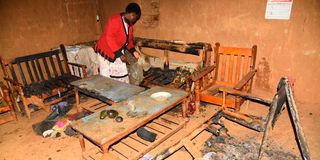A tale of three widows: How cultural practices, legal loopholes left us homeless

Agnes Jepkemoi, a widow, inside her house at Nessuit, Njoro Sub-county in Nakuru County. Her in-laws torched the house on October 20, 2020.She says they stormed her home that night and burned it as she watched. The incident followed a nine-year clash over five acres of land owned by her late husband who died in 2011.
What you need to know:
- Widows in Kenya face widespread disinheritance by their in-laws after their husbands' deaths.
- A number of organisations are working to empower these widows through economic initiatives.
In rural Kenya, the death of a husband often marks the beginning of a harrowing journey for widows, who find themselves battling family members for their rightful inheritance.
The stories of Pamela*, Caren*, and Angeline Ako illustrate a widespread problem of land grabbing and disinheritance that leaves many widows destitute and struggling to support their children.
Pamela's story begins with her marriage at just 13 years old in 1996. Three years later, at 16, she was widowed with two young daughters when her husband died of food poisoning. This tragedy exposed her to the harsh reality of family disputes over her late husband's ancestral land.
"Before the death of my husband, his younger brother and my father-in-law were among those who cared for me," Pamela recalls.
Months after the burial, her father-in-law suggested that the deceased's younger brother inherit her, a proposal both her mother-in-law and the brother declined.
Abandoned family
Pamela, now 43, explains she married young after becoming pregnant and dropping out of school in Class Eight.
Following her husband's death, the family abandoned her and her children. Three years later, a man unrelated to her husband inherited her with her father-in-law's blessing. Pamela continued living at her husband's home, eventually bearing five more children.
The real conflict arose when her late father-in-law divided the ancestral land, giving Pamela a portion. He owned two parcels; one rocky and uncultivated for over 20 years, the other farmland.
Initially, her brother-in-law suggested Pamela settle on the rocky land, but her father-in-law refused, dividing both lands equally between them and helping Pamela build a house.
However, the old man died shortly after Pamela settled. Her brother-in-law then secretly transferred land ownership to himself and sold parts of Pamela's inheritance, leaving only the space where her hut stood. He threatened her to relocate or lose everything, viewing her children born after her husband's death as threats to his land ownership.
"He then started threatening me to relocate to the rocky land or risk losing both," says Pamela. "He would tell me to take the children born after my husband's death back to their father. He saw them as a threat to his land ownership."
Pamela sought help from the local chief, but to no avail as the land was now in her brother-in-law's name.
Her story echoes hundreds of women who lose family land after their spouses' deaths.
Caren's story is similarly distressing. Married in 1996, she cultivated one acre with her husband, who planned to build a house there. When he died in 2002, her brother-in-law took the funeral contributions that remained and most of the land, leaving her only enough for a house.

Emmaculate Onyango, in this photo taken on January 19, 2022, is a mother of one. After becoming a widow, her in-laws disinherited her. Today, she is the champion helping widows in Bangladesh Slums in Mombasa.
Like Pamela, Caren found the land ownership had been transferred without her knowledge.
"I have been struggling since then. My children have never proceeded to college despite doing well in high school due to financial constraints," says Caren.
She believes that had she been granted the piece of land, she could have used the proceeds to educate her children.
Angeline Ako recently lost her land and cattle to her brother-in-law after her husband's death. She was told she had no right to them without having brought animals to the family or having daughters married off for bride price.
These widows have now found support through Stawisha Dada (Stada), an initiative empowering widows through group activities like basket weaving and small businesses. The organisation helps them raise funds for their families and children's education.
Caren explains, "We have been put together in groups where we run different activities including basket weaving and small businesses. The group has helped us raise funds to support our families and educate our children."
Read also: How Africa treats its widows
She adds, "I have seen women move out of their late husband's home, rent houses and later forced to remarry after their parcels of land are grabbed. Disinheritance stagnates the widows' progress and those without jobs are left to beg. It is time we are informed about the legal procedures to follow to protect our lands."
On June 21, 2024, widows from Kisumu County gathered in Nyakach Constituency to mark International Widows Day, focusing on equitable land rights.
The event, held in partnership with Stada and Inuka, aimed to expose the challenges widows face and ensure their rights are protected by amplifying their voices.
Patricia Orao of Stada emphasised the need to protect widows' rights and properties, noting that many still face disinheritance despite existing laws.
"There have been cases of women losing ancestral land after a family member decides to change ownership titles. Others are raped or killed," Patricia stated during the event.
Counselling
She noted that some widows are pushed into poverty and children forced to drop out of school.
"The government needs to do more to protect properties and lands owned by the widows so that they can enjoy and live peacefully after the death of their spouses," Patricia urged.
Stada works with widows in Kisumu County, offering counselling, group therapy, and economic empowerment through table banking. Their goal is to ensure widows can live peacefully and maintain economic stability after losing their spouses.
"We offer counselling support, help the women register in groups and organise table banking. The proceeds are used to cater for their families' needs," Patricia explained.
The three widows’ stories highlight the urgent need for stronger enforcement of property laws and cultural change in Kenya. While legal protections exist on paper, the reality on the ground often leaves widows vulnerable to exploitation and poverty.
*Names changed to protect the widows' identity.






